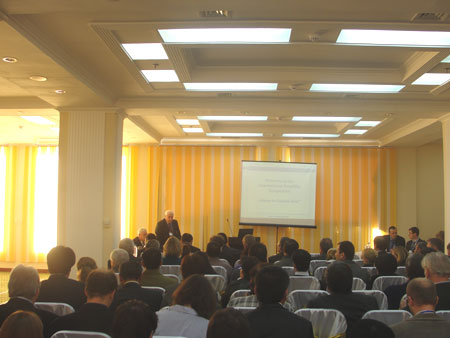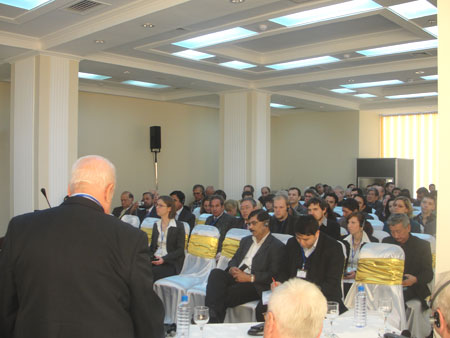International Scientific Symposium «Water in Central Asia»
An international scientific symposium “Water in Central Asia” was held with the support of the German Federal Foreign Office in November 24-26, 2010 in the city of Tashkent. The co-organizers of this event was the CAWa project, SIC ICWC, and the German Research Center for Geosciences GFZ.
Central Asia faces big water-related challenges, among them water scarcity, degrading water quality and inefficient water use.


The impact of climate change on the region’s water resources, although studied by a number of Central Asian and international researchers at various scales, is not yet known in detail. The results obtained from different scientific approaches like trend analyses, climate models and hydrological models have to be compared and validated to give an overall picture of the region’s future water budget. Various scenarios have to be considered.
In present days, water managers are coping with significant data gaps hampering water management decisions. Not all processes influencing the water balance are yet quantified – such as the interaction of ground and surface water. Today, space-based information on land cover and water-related parameters offers great opportunities to bridge those gaps. Their incorporation into integrated water management models is expected to significantly improve water management.
The project “Central Asian Water” (CAWa) is part of the Central Asia Water Initiative (also known as the Berlin Process), which was launched by the German Federal Foreign Office on 1 April 2008 at the “Water Unites” conference in Berlin. It intends to contribute to a sound scientific and a reliable regional data basis for the development of sustainable water management strategies in Central Asia
The participants included researchers from Central Asian and international institutions, specialists from hydrometeorological services, water managers, representatives from development agencies.
The opening ceremony was held by the Director of SIC ICWC Prof. V.Dukhovny, His Excellency Ambassador of Germany in Uzbekistan W. Neuen, the CAWa Coordinator Prof. B. Merz, and V.Akhmadjonov.
Bruno Merz has presented CAWa activities to the participants. He noted that the CAWa project intended to contribute to a sound scientific and a reliable regional data basis for the development of sustainable water management strategies in Central Asia.
Vakhid Akhmadjonov in this report underlined the importance of holding such events, strengthening international and regional water cooperation, and adopting IWRM principles in the region and emphasized a water conservation issue.
The international symposium focuses on applied research against the background of Central Asian water management trying to bridge the gap between scientists and water managers. The symposium aims to:
- present and discuss the preliminary results of the CAWa project,
- review current research achievements in Central Asia,
- discuss new scientific methods to approach Central Asian water issues,
- debate regional research priorities,
- promote regional cooperation among scientific institutions from Central Asia and the EU,
- provide a platform for the strengthening of international networking through sharing and mutual learning.
More than 100 scientists from Central Asian countries, Afghanistan, Germany, Switzerland and Russia took part in the Symposium.
The program consisted of:
- four individual sessions, and
- a poster session.
The Symposium focused on the following themes in four sessions:
1. Water availability in CentralAsia: Past, present, future
The session was co-chaired by Dr. Sergeiy Vorogushyn and Dr. Natalya Agaltseva.
Global change will affect the amount, temporal distribution and quality of naturally available water resources in Central Asia - with consequences for water management. This session focused on the assessment of the dynamics of change using climate and hydrological models, trend analyses and scenario development.
H.G. Kunstmann, M.Mueller, D.Duethmann, A.Sorokin, B.Libert, A.Lineitseva, A.Manditchev, M.Ikramova and others made their respective presentations.
2. Water management in agriculture:Processes, modeling and implementation
The keynote speaker and chair of the session was Victor Dukhovny. The presentations were given by O.Anarbekov, U.Djanibekov, I.Dernedde, A.Akramkhanov, G.Stulina, H.Oberhaensli, M.Khorst, N.Mirzaev, A.Karimov, M.Bekchanov, I.Bobojonov, K.Jumaboev, N.Djanibekov, and Yu.Kamalov.
Water managers in Central Asia are facing large challenges, such as optimal water allocation, increased irrigation efficiencies, selection of appropriate crops, soil salinisation. Yet, not all processes influencing these tasks are fully understood and quantified. This session covered processes affecting agricultural performance such as interactions between surface and groundwater, as well as monitoring methods, integrated models for water managers and approaches to increase water productivity.
3. Remote sensing and information systems for sustainable water and land management
The keynote speaker was C.Conrad. Kamilya Kelgenbaeva chaired the session. The presentations were given by U.Gessner, D.Klein, A.Gafurov, J-F.Cretaux, M.Idiev, C.Zech and others.
Remote sensing offers great opportunities for natural resource managers, scientists, and policy makers. Crucial information on the land surface can be derived at different spatial scales and for repetitive time steps, e.g. on land use, land cover, snow, soil moisture changes. Such earth observation and other information can be tailored to the needs of users and visualized in information systems. This session was dedicated to remote sensing applications and information systems and their potential for supporting sustainable water and land management.
4. The dynamics of the cryosphere and its role in the Central Asian water cycle
The session was chaired by Wilfried Hagg. Reports were made by M.Hoelzle, A.Yakovlev, A.Finaev, D.Kriegel, C.Mayer, M.Petrov, V.Konovalov, A.Zubovich abd others.
The cryosphere accumulates significant amounts of water in the Central Asian high mountains and is thus a key source of water supply. Yet, it is particularly fast responding to increasing temperatures and changed precipitation patterns. This session was dedicated to glacier and snow cover dynamics in Central Asia, monitoring methods and the quantification of the cryosphere’s role in Central Asian water balances.
The speakers presented data on Central Asian glaciers and monitoring data by LANDSAT, TERRA-ASTER, SPOT, IRS-LISS and other space facilities. By using the hydrological model WASA, researchers even reconstructed the glacier mass balance and filled the data gap from 1993 to 2005. The EC IFAS member from Tajikistan Mr.M.Kazakov gave his proposals on glacier studies. Particularly those referred to the establishment of a fund for glacier research and conservation, including capacities for glacier observation in Kyrgyzstna and Tajikistan, glaciological expeditions, the provision of weather stations with equipment for monitoring of climate and snow-ice cover, the development of an information system, GIS and database on glaciers and hydrometorological conditions by using RS and field observations.
Each presentation was followed by lively discussions.
The Symposium was very fruitful and the participants shared very actively their experiences and information. It is important to note that scientists from Afghanistan took part in the Symposium as well.
|